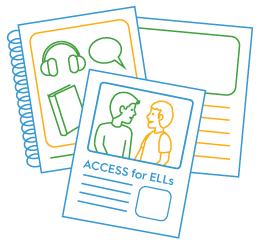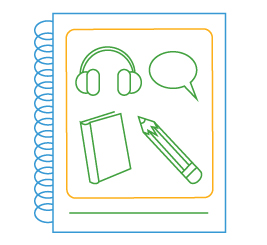Resources/Recursos
Featured Resources



All resources/Todos los recursos
Filter resources by:
Resources/Recursos
Supporting Multilingual Learners With Disabilities: Parent-Teacher Collaboration
Building strong family-school partnerships is key to student success. This handout shows how one teacher collaborates with a student’s mother, gathering insights about her child’s strengths and needs to build a supportive and inclusive classroom.
For more context around this resource, please visit the Supporting Multilingual Learners With Disabilities page.
Resource Details View Download NowReleased October 2025
Reflection Tool: UDL and Language Considerations for Instructional Planning
This tool provides practical, ready-to-use strategies from the WIDA and UDL frameworks to help you create accessible and engaging lessons for multilingual learners with disabilities.
For more context around this tool, please visit the Supporting Multilingual Learners With Disabilities page.
Resource Details View Download NowReleased October 2025
Universal Design for Learning Example Ideas Chart
This handout provides ideas for applying the Universal Design for Learning (UDL) framework in your classroom. It offers strategies to help all students, including multilingual learners with disabilities, participate in meaningful and challenging learning.
For more context around this resource, please visit the Supporting Multilingual Learners With Disabilities page.
Resource Details View Download NowReleased October 2025
Supporting Multilingual Learners With Disabilities: Information Collection Tool
Use this handout to explore student intersections of language, disability, home, community, and academics. Engage with the guiding questions collaboratively with colleagues and caregivers to inform instructional planning.
For more context around this resource, please visit the Supporting Multilingual Learners With Disabilities page.
Resource Details View Download NowReleased October 2025
The Pracademics Pathway to Support Multilingual Learners
Educators of bi/multilingual learners engage in multiple roles within their school communities to advocate for student success. When educators engage in research practices, they gain a deeper understanding of their students’ cultural backgrounds and academic and emotional needs. This Focus Bulletin features some approaches to encourage practitioners to engage in research more intentionally, not only to inform their classroom practice but to contribute to the field and elevate their dual roles as practitioners and academics and this way honor and value their pracademic identity.
Resource Details View Download NowReleased October 2025
Action Research Report Template
This report template for action research serves as a guide to share action research results. It may be adapted and modified according to the contextual needs of each pracademic. The template is an authorized adaptation of “Writing a Report of Action Research/Teacher Research,” by Kathy Short, 2018.
This template is meant to be used in tandem with The Pracademics Pathway to Support Multilingual Learners Focus Bulletin.
Resource Details View Download NowReleased October 2025
Plantilla sugerida de Informe de investigación-acción
resultados de investigación acción. Puede adaptarse y modificarse según las necesidades del contexto de cada pracadémico. La plantilla es una adaptación autorizada de “Writing a Report of Action Research/Teacher Research”, de Kathy Short, 2018.
Esta plantilla es para utilizar en conjunto con el Boletin El camino de los pracademicos para apoyar a los estudiantes multilingües.
Resource Details View Download NowReleased October 2025
WIDA Kindergarten Scoring Rubric for Speaking
Review this rubric before administering WIDA ACCESS for Kindergarten to understand the expectations for each speaking task.
Resource Details View Download NowReleased September 2025
WIDA Kindergarten Scoring Rubric for Writing
Use this rubric to assign a score to writing responses on WIDA ACCESS for Kindergarten.
Resource Details View Download NowReleased September 2025
Indigenous Language Reclamation Through Community Partnerships: Strategies for Sustainable Growth
As educators, leaders, and community partners dedicated to supporting Indigenous students, we share a responsibility to sustain and revitalize languages and cultures that have often been underrepresented in educational spaces. Indigenous language and culture reclamation goes beyond simply keeping languages and cultures alive; it is also about affirming identity, strengthening sovereignty, and nurturing resilience. This Focus Bulletin highlights strategies and examples of how community partnerships can sustain Indigenous languages and cultures. Drawing from the experiences of WIDA’s Indigenous partners — California Indian Education for All, the Lower Kuskokwim School District, and Sealaska Heritage Institute — it showcases practices that foster trust, center Indigenous knowledge, and advance educational sovereignty. Educators will find practical classroom considerations, insights for creating culturally sustaining learning environments, and guidance for cultivating respectful and reciprocal partnerships with Indigenous communities. These perspectives emphasize how community-rooted collaboration can support Indigenous students’ success as well as honor the vitality of their languages and cultures.
Resource Details View Download NowReleased September 2025
Student-Centered Learning Environment: Increasing Access to Learning
This video shows how educators create welcoming environments where all students feel included and supported. It focuses on using students’ strengths and experiences to connect language and content.
Resource DetailsReleased September 2025
Amplifying Family Voice
This handout highlights the importance of partnering with families. Learn how one educator brings families, students, and school leaders together through monthly meetings.
For additional context, including additional resources and videos, please visit the Standards in Action page.
Resource Details View Download NowReleased September 2025
Context Driven Language Practice
Discover how one educator helps multilingual students boost writing scores using Google Sites, WIDA assessment prompts, and rubrics to build skills and confidence.
For additional context, including additional resources and videos, please visit the Standards in Action page.
Resource Details View Download NowReleased September 2025
Anchor Chart
This anchor chart highlights helpful words and math terms that students can use when explaining how to solve an equation in English. It includes sequence words, cardinal numbers, and math terms.
For additional context, including additional resources and videos, please visit the Standards in Action page.
Resource Details View Download NowReleased September 2025
Reflecting With Proficiency Level Descriptors
This handout shows how educators use the WIDA Proficiency Level Descriptors (PLDs) to scaffold lessons. It explains how they help students learn both the subject and the language.
For additional context, including additional resources and videos, please visit the Standards in Action page.
Resource Details View Download NowReleased September 2025
Scaffolding Socratic Seminars
A 6th grade English Language Arts (ELA) educator shares how she supports multilingual students during Socratic seminars by focusing on both content and language.
For additional context, including additional resources and videos, please visit the Standards in Action page.
Resource Details View Download NowReleased September 2025
Case Examples of English Learners With Significant Cognitive Disabilities
This ALTELLA Research Brief provides case examples of multilingual learners who have significant cognitive disabilities. The brief has five student examples: Sabeen (grade 1), Chung (grade 2), Chue (grade 4), Isabel (grade 6) and Luis (grade 10).
Resource DetailsReleased September 2025
Establishing a Definition of English Learners With Significant Cognitive Disabilities
This ALTELLA Research Brief defines “English learners with significant cognitive disabilities” and explores related key concepts.
Resource DetailsReleased September 2025
Nonverbal Communication in Diverse Classrooms: Intercultural Competence Considerations for Supporting English Learners With Significant Cognitive Disabilities
Use this ALTELLA Research Brief to learn about nonverbal communication, which is an important component of communication for multilingual learners with significant cognitive disabilities. The brief explores the individual cultural differences in nonverbal communication for these students.
Resource DetailsReleased September 2025
Individualized Education Programs for English Learners With Significant Cognitive Disabilities
Use this ALTELLA Research Brief to plan and prepare for IEP meetings for multilingual learners with significant cognitive disabilities. The brief highlights key elements to consider, including the importance of the student’s home language and the need to build cultural responsiveness among all educators.
Resource DetailsReleased September 2025




